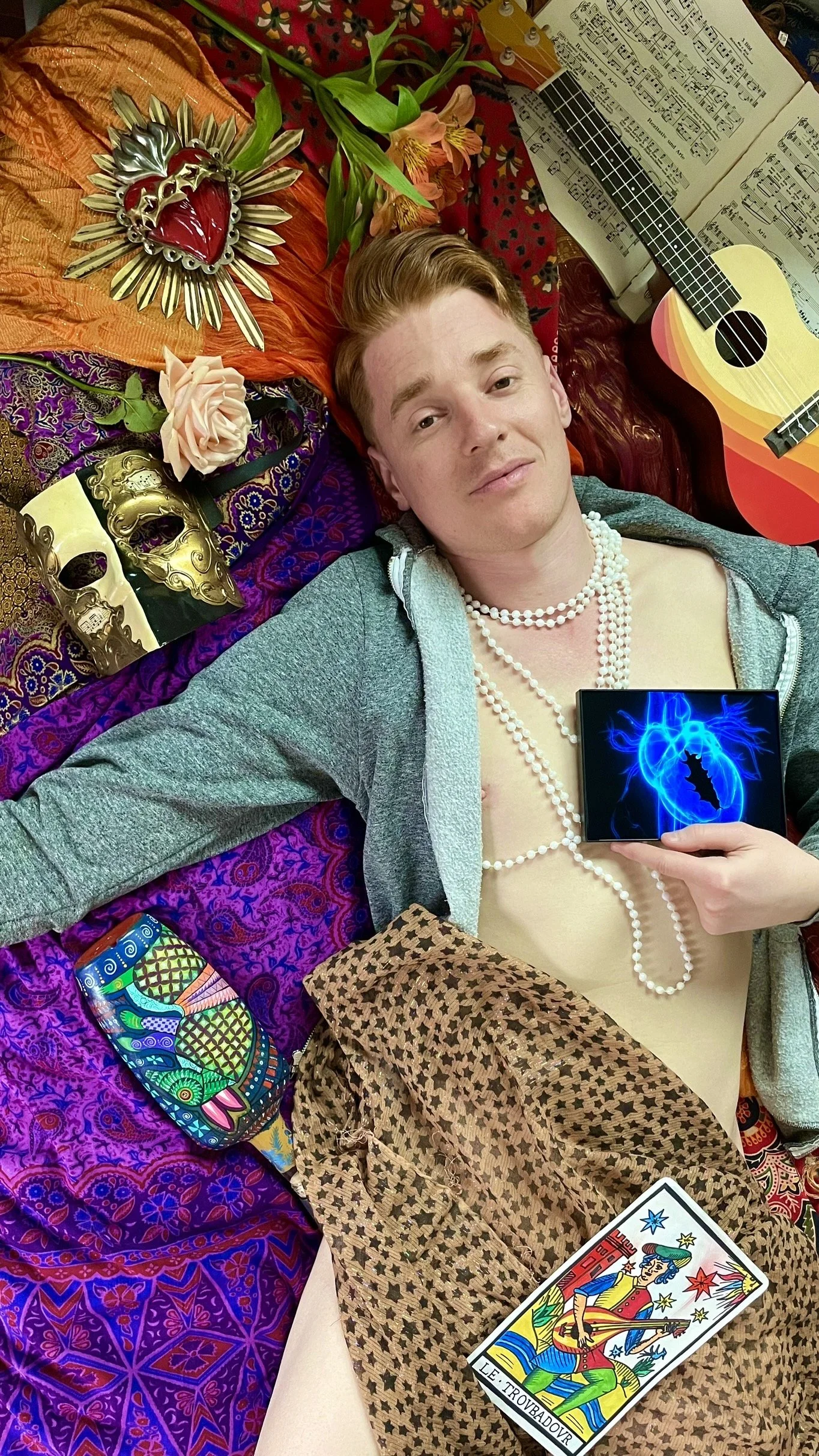Tenor Isaiah Bell probes the depths of desire, rejection in The Book of My Shames
Rooted in opera, the live music-theatre hybrid features everything from satirical cabaret to spoken word
The Book of My Shames.
City Opera Vancouver presents The Book of My Shames from May 18 to 20 at 7:30 pm at The Firehall Arts Centre
VICTORIA, B.C.-BASED classical tenor Isaiah Bell has performed in everything from Rufus Wainwright and Daniel MacIvor’s Hadrian at the Canadian Opera Company to Vancouver Opera’s The Barber of Seville to City Opera Vancouver’s English adaptation of La voix humaine (The Human Voice). His new solo show co-created with director Sean Guist has roots in the artform he loves—but it’s also a total departure. The Book of My Shames is a live music-theatre hybrid that features Bell’s original words and score, with cabaret songs, chansons, ballads, and more, as well as some no-holds-barred confessions and raw, honest humour. Plus a story about a hole.
The Book of My Shames started from an 18-minute stand-alone “memory opera” monologue-in-music that Bell had written for another project a few years ago. Guist invited him to perform it at a cabaret he was programming and, upon seeing it, suggested it become a show of its own. Here’s the tagline: “a persistent emptiness of heart drives a youth from a restrictive fundamentalist commune to a passion for bad men, and onto a successful but strangely hollow life on the stage”. The work reminds that desire, rejection, shame, and the longing to be loved are universal themes.
The piece also explores the gap between how Bell feels on the inside and how he presents on the outside, “between who I am and who I feel I want to be, or could be, or should be”, Bell tells Stir. “There’s a tongue-in-cheek song at the top of the show called ‘Hungry Hungry Hole’ where I say, you might think this story’s mine, but really I’m at the mercy of this hole… all my compulsive behaviours and bad decisions, all this life-activity, is just me trying and failing to get across the hole.”
About to have its Vancouver premiere, the work runs about 80 minutes without intermission, with half music, half talking. “This is sometimes a little surprising for people who come expecting an opera,” Bell notes. “But it’s the best way to negotiate this split-brained thing; there’s a tension, almost a conversation, between the modern, self-actualized, well-spoken urban person who’s always trying to figure things out, and the seemingly unchanging and unchangeable hungry soul underneath that hasn’t been properly cared for.
“So when I’m talking it’s often jokey, or ironic, and there’s lots of room for laughter, and then the singing comes from this other world, from underneath. There are many different colours in the music, but the unifying quality is open-hearted and tender….There’s a bit of satirical cabaret off the top that lives more in the spoken-text world; there’s music you might refer to as ‘torch song’-esque; there’s that big story scene that flashes through a million different moods and colours in real time… It’s hard for me to talk in terms of genre or style because it’s my own music, but it is definitely influenced by the classical tradition, which is my training, as well as a cabaret or ‘chanteuse’ aesthetic, which is the music I often finds speaks to me most directly.”
Isaiah Bell (left); Sean Guist.
Bell got his start as a tenor in City Opera’s production of Benjamin Britten's Curlew River in 2010 as Madwoman, which led to leading roles all across Canada. He has appeared in concert with Vancouver Symphony Orchestra, Toronto Symphony, San Francisco’s Philharmonia Baroque, the National Arts Centre Orchestra, and the Oratorio Society of New York, among other organizations. Excelling in the music of Britten, Handel, and Bach, he has also curated solo recitals that combine traditional repertoire with spoken poetry and original compositions. During pandemic shutdowns, he not only performed in but also adapted and translated Poulenc’s solo opera La voix humaine for a City Opera filmed production; he designed hybrid concept recitals for Early Music Vancouver and Ottawa Chamberfest, which featured his own music and poetry alongside classical works. The Book of My Shames was first developed with the support of Pacific Opera Victoria and Intrepid Theatre and had its premiere in a version for voice and piano in 2019 as a co-presentation between Tapestry Opera and Pride Toronto.
Having gotten into opera via theatre, Bell says that one of the things he loves about singing classical music is that “it always keeps me honest and demands that I stay present, always keep working, pay attention, and don’t get lost in my head,” Bell says. “These are the most difficult things for me to do, with my wandering mind, but they are the only way I can survive in this life. If I was doing something slightly easier I would not be forced so constantly to confront my demons—and grow as a person, as a byproduct, I don’t think. And I actually hate to be uncomfortable and to air my true vulnerability in front of people, no matter what the content of this show might imply. There’s nowhere to hide in singing, especially classical singing; your voice will reveal problems about your being that you didn’t know you had. Though this isn’t something I talk about in the show specifically, that’s actually a big part of the genesis of the personal work that led to me doing this show.
“I should say, though, that this isn’t a ‘therapy show,” he adds. “It’s not about me forcing people to sit there and watch my trauma or my catharsis. I’ve said in program notes that I’m only still doing this show because I sense when I am performing it that there is a sense of life in the room, that some people anyway are picking up what I’m putting down, and that the experiences I’m talking about, specific though they are, are reaching across the proverbial footlights and making connection with other humans. That’s my big hope, to examine my experience as deeply and clearly as possible with the aim of allowing people a prism through which to see something new about themselves.”














